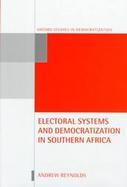Electoral Systems and Democratization in Southern Africa
- List Price: $230.00
- Binding: Hardcover
- Publisher: Oxford University Press
- Publish date: 05/01/1999
Description:
Introduction1: Defining and Measuring the Trajectory of Democratization2: Defining the Intervening and Explanatory Variables3: Choosing an Electoral System4: Majoritarian or Power-Sharing Government5: Plurality Case Study Election Results: Malawi, Zambia, and Zimbabwe6: PR Case Study Election Results: South Africa and Namibia78 Cross-Country Comparisons: Legislative and Executive Inclusion9: Conclusion: The Case for Democratic Optimism
Expand description
Product notice
Returnable at the third party seller's discretion and may come without consumable supplements like access codes, CD's, or workbooks.
| Seller | Condition | Comments | Price |
|
HPB-Red
|
Good
|
$4.50
|
|
Ergodebooks
|
Good |
$16.29
|
|
sequiturbooks
|
Like New |
$45.00
|
|
Sequitur Books
|
Like New
|
$50.62
|

Please Wait

